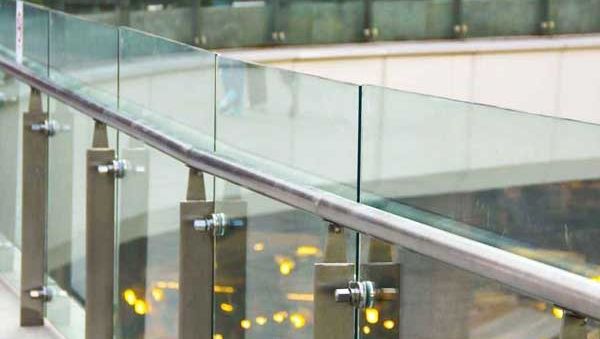
18/01/2023 0 Comments
Toughened Glass: Your Questions Answered
Toughened glass, or tempered glass as its sometimes known, has many applications. If you have been on a balcony with a glass railing or climbed a glass staircase, you were in direct contact with tempered glass. Despite its ubiquity, most people don't know the first thing about this glass variety. As one of Ireland's largest suppliers and fitters of toughened glass, we get lots of questions from our clients. To help you better understand toughened glass, we've gathered the most common questions below and added comprehensive answers. Read on to learn more about toughened glass.
What is toughened glass?
Toughened glass is a type of safety glass treated with a process called tempering, making it stronger and more durable than regular glass. The process involves heating the glass to a high temperature and then rapidly cooling it, which causes the surface of the glass to compress and the centre to expand. This creates a glass up to four times stronger than regular glass and can resist thermal stress and impacts. Toughened glass is commonly used in car windows, shower doors, tabletops, etc.
How to check if glass is toughened?
There are a few ways to check if glass has been toughened:
- Visual Inspection: Toughened glass has a distinctive appearance, with small, even cracks radiating from the edges and corners. These cracks, known as "stress patterns," result from the tempering process and are unique to toughened glass.
- The "Pinch Test": Toughened glass is much stronger than regular glass, so it will not bend or flex as easily. You can test this by pinching or flexing a small corner of the glass between your thumb and finger. Toughened glass will feel much more rigid and resistant to bending.
- Edges and corners: Toughened glass has smooth edges and corners, unlike annealed glass, which has sharp edges.
- Sticker or Laser Etching: Many manufacturers of toughened glass will have a sticker or laser etching on the glass to indicate it is toughened.
It is important to note that these methods are not foolproof, and sometimes it is impossible to check for sure if the glass is toughened without breaking it, so it is always best to ask the manufacturer or supplier.
How tough is toughened glass?
Toughened glass is significantly stronger than regular, annealed glass. Tempered glass is up to four times stronger than standard glass. Toughened glass can also resist thermal stress and impacts better than regular glass.
Toughened glass can withstand a significant amount of force before breaking. It can withstand impact from a steel ball dropped from a height of 1 meter (3.3 feet) without breaking, and it can also resist thermal stress caused by sudden temperature changes.
However, it is important to note that while toughened glass is more robust than regular glass, it is not unbreakable. It can still break under extreme force or high impacts and is also vulnerable to chipping or shattering if hit by a sharp object.
Also, The strength of the toughened glass can vary depending on the thickness and quality.
When is toughened glass required?
Toughened glass is required in various applications where safety and strength are concerned. Some common examples include:
- Automotive: Toughened glass is used in the side and rear windows of cars and in the windshield to provide added protection in the event of an accident.
- Construction: Toughened glass is often used in building construction for applications such as shower doors, skylights, and partitions, as well as in balconies, balustrades, etc.
- Furniture: Toughened glass is used for tabletops, shelves, and other furniture applications.
- Appliances: Toughened glass is used in ovens, microwave ovens, etc.
- Safety and security: Toughened glass is often used in security applications such as doors, windows, and partitions, as well as in bulletproof glass, as it is much stronger than regular glass and can resist impacts.
- Electronic devices: Toughened glass is used in smartphones, tablets, and other electronic devices to protect against impacts and scratches.
What is the difference between horticultural glass and toughened glass?
Horticultural and toughened glass are both types of safety glass, but they have different characteristics and are used in different applications.
Toughened glass is a type of safety glass that is treated with a process called tempering, which makes it stronger and more durable than regular glass.
Horticultural glass, on the other hand, is a type specifically designed for use in greenhouses and other horticultural applications. It is made from thicker and stronger glass than regular glass, that's layered with a special coating that allows more light to pass through. This benefits plants by enabling them to receive more light and grow better. Horticultural glass is also more resistant to thermal stress, which is vital for maintaining the temperature inside the greenhouse.
In summary, Toughened glass is a type of safety glass that is treated to be more robust and durable, whereas horticultural glass is a type of glass specially designed for horticultural applications.
Do you still have questions? Please call us directly. Our friendly and knowledgeable customer service team will be more than happy to answer any toughened glass enquires you may still have.

Comments
Leave a comment